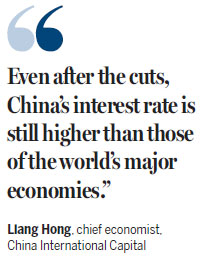China moves to lift liquidity
Updated: 2015-08-26 11:22
By Paul Welitzkin in New York(China Daily USA)
|
||||||||
Stocks still sell off despite cuts in rates, reserve ratio
Economists believe that moves by China's central bank on Tuesday to increase liquidity in financial markets will help stabilize the economy amid a global stock selloff and a slowing national economy.
The People's Bank of China (PBOC) reduced its one-year benchmark deposit rate to 1.75 percent from 2 percent and the one-year benchmark lending rate to 4.60 percent from 4.85 percent.
The reserve requirement ratio, which determine how much banks must keep in reserves, was cut by a half-percentage point with the goal of stimulating lending.
According to a research note from economists Marvin Chen, Grace Ng and Haibin Zhu at JP Morgan, this will inject about 670 billion yuan ($104.5 billion) of liquidity into the banking system.
Ma Jun, chief economist of the central bank's research bureau, said the cut in interest rates and the reserve ratio will help to stabilize expectations but it doesn't change the "prudent" monetary policy.
Liang Hong, chief economist at China International Capital Corp, said intense deflationary pressure was the main factor behind the rate cuts. "Even after the cuts, China's interest rate is still higher than those of the world's major economies," said Liang, who believes low inflation leaves room for additional policy fine-tuning.
Sung Won Sohn, a professor of economics at California State University Channel Islands in Camarillo, California, said the Chinese government is moving in the right direction to stabilize financial markets.
"The government has a lot of room to ease monetary and fiscal policies further. In addition, the inflation is benign. Stay tuned for more cuts in the interest rate and reserve requirements," Sohn said.
Sohn said the combination of lower interest rates and bank reserve requirements will keep banks' margins stable.
"Consequently, the banks will pass the benefits onto consumers, businesses, local governments, etc. Bond yields in China will fall as well. That's what the government expects," he said.
China's central bank took action amid the biggest slide in stocks since 1996 in the mainland. Chinese stocks continued their turbulence Tuesday with the benchmark Shanghai Composite index sinking a further 7.6 percent to below the 3,000 level. It slumped 8.5 percent on Monday.
Concerns over China's economic health also have roiled global markets in recent days.
Equity markets in Europe posted gains on Tuesday after Monday's sharp selloff. The US markets, after being in positive territory most of the trading day, slumped after a late selloff.

Talian Chi, professor and Carl A. Scupin Faculty Fellow at the University of Kansas, said that the PBOC has room for additional easing.
"Since the PBOC probably has better information about the state of the Chinese economy than anyone else, I presume that they do think that the current round of reduction is likely sufficient, while being prepared to do more if necessary," Chi said.
"After the latest experience with devaluation, the government will be cautious going forward. The Chinese moves have led to competitive devaluations among Asian currencies, reducing the benefits of the devaluation. The weak global economy means that devaluation won't be as effective," Sohn said.
"In the past, the government's control of the value of the RMB to the dollar and other key currencies has been anchors for many emerging market currencies. Now that the anchor is no longer reliable, increased volatility in EM currencies, especially those related to commodities will be the norm," added Sohn.
Chi sees this as an issue of communication.
"The market was surprised and inferred that the PBOC might have seen a more rapidly worsening economy than previously thought. The PBOC is likely to accompany future adjustments in the value of the renminbi with more vigorous press activities to present their reasoning in a clearer and more persuasive manner," he said.
Chen Jia in Beijing contributed to this report.
paulwelitzkin@chinadailyusa.com
(China Daily USA 08/26/2015 page1)
- Turkey to hold snap parliamentary election
- Caroline Kennedy used personal email for official business
- Czech appeals for closing Schengen external border
- DPRK says inter-Korean contact gives lesson to South Korea
- Trial starts for Chinese scholar expelled from Norway
- Britain to crack down illegal working

 Female honor guards train for military parade debut
Female honor guards train for military parade debut
 Floral replica of the Great Wall appears on Tian'anmen Square
Floral replica of the Great Wall appears on Tian'anmen Square
 Chinese long jumpers leap to history
Chinese long jumpers leap to history
 Goodbyes and tears as left-behind children head home
Goodbyes and tears as left-behind children head home
 Top 10 richest universities in China
Top 10 richest universities in China
 Chinese long jumpers leap to history
Chinese long jumpers leap to history
 Female honor guards train for military parade debut
Female honor guards train for military parade debut
 Top 10 richest universities in China
Top 10 richest universities in China
Most Viewed
Editor's Picks

|

|

|

|

|

|
Today's Top News
Central bank lowers lending rate to ease debts
Officials on suspended death sentence face life behind bars
US National Security Adviser Rice to visit Beijing this weekend
Warner Bros plans to develop Chinese-language movies
Central bank announces rate cut to bolster real economy
Investors in for long haul amid selloff
30 heads of state to attend China's Victory Day celebrations
ROK, DPRK agree to defuse tension
US Weekly

|

|





